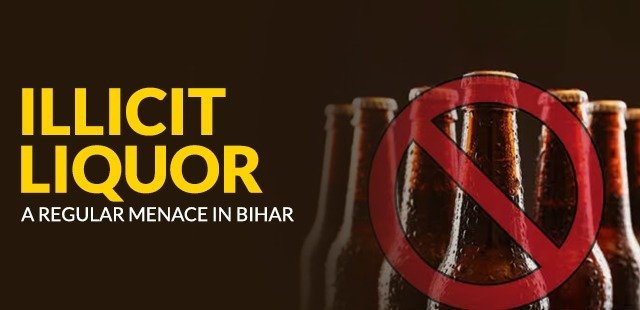ILLICIT LIQUOR : A REGULAR MENACE IN BIHAR
ILLICIT LIQUOR : A REGULAR MENACE IN BIHAR

Apart from everything, Bihar has been known as a “dry state” for a long time. It’s been a long time since the government of Bihar banned the legal selling and buying of liquor, alcohol, etc. Talking about the date it started, it is 2024 today, and our state has been alcohol-free since April 1st, 2016
Being a pride in itself, the state has always been praised and known for being a dry state as the legal consumption of alcoholism has always been restrained.
But do you think, it is actually being practiced? Can you really agree that the tag of Bihar being a “dry state” is in real action? Let me tell you, it’s not. There are several ways in which, every recent day there is a continuation of illicit consumption of alcohol.
Known boldly as desi daaru, taadi, or country-made liquor, not only defies legal norms but also poses important health hazards and social challenges to the community.
Starting from the family issues in the weaker sections to the drunk and driving cases, it has always hampered society and the environment in numerous ways.
The harmful presence
Illicit liquor is an active presence in many parts of Bihar, primarily due to its affordability and availability. Often brewed or made under unregulated conditions, it bypasses quality control measures, making it dangerous for consumption. This underground market thrives due to its lower cost compared to legally manufactured liquor, affecting vulnerable segments of society.
Health Hazards
The consumption of Illicit liquor is extremely hazardous to health. Poor distillation and cheap substitutes for ethanol result in toxic levels of methanol, leading to blindness or even death. Cases of mass poisoning because of spurious liquor consumption prove how deadly the consequences of this illicit trade are.
Economic Ramifications
Apart from health risks, the proliferation of illicit liquor undermines the state’s economy. It deprives the government of a very hefty amount of revenue that may be applied for developmental purposes. The illegal nature of the trade incites corruption and poses problems to law enforcement agencies, thereby getting into a vicious circle where it perpetuates.
Social Impact
The social impact of illicit liquor is huge. Addiction can break families, and cases of domestic violence very often coincide with abuse of alcohol. Besides, illegal status leads to a culture of secrecy and can result in fear, making it difficult for affected people to seek help or support.
Legal and Regulatory Framework
Though Bihar has adopted both legislation and periodic crackdown approaches to deal with the problem of illicit liquor, the task remains really formidable. Strengthening the enforcement mechanism, enhancing community awareness, and promoting alternative livelihoods for those involved in such illicit trade remains important for long-term solutions.
Community initiatives
The community-based intervention plays a very important role in fighting this problem. Large-scale campaigns on the dangers of spurious liquor, coupled with responsible drinking interventions, can ensure a healthier social environment. Local leaders, NGOs, and other grassroots organizations can play an important role in organizing communities against such menace.
The Way Forward
The illicit liquor problem in Bihar can be overcome only through a multi-pronged approach of enhancing law enforcement, creating public awareness, advocating responsible drinking, and most importantly, providing socioeconomic alternatives. Such change can only be affected after proper understanding and collaboration among government agencies, civil society organizations, and the community.
Conclusion
Though the problem of illicit liquor has been haunting Bihar, there is some hope. We can work towards a future where the shadows of illicit liquor will not darken the lives of its people if the core issues are identified, awareness spreads, and participation from the community comes up. It is a collective responsibility to safeguard public health, hold legal norms, and build a society where the well-being of every citizen is prioritized over illicit gains